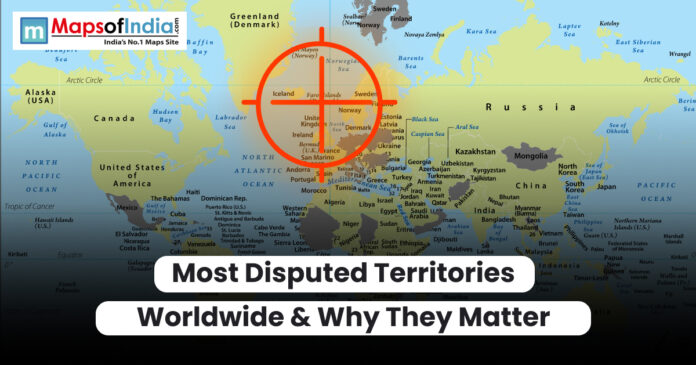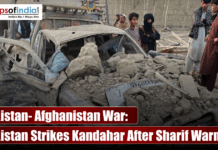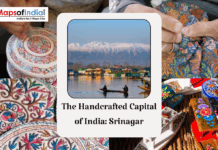Nation-states, boundaries, and international law characterize the contemporary world, but the extent is far from finalized on maps. Throughout the world, we find contested territories, territories disputed by two or more parties, which are both tense and usually violent, as well as having competing histories. These locations did not exist as cartographic oddities. They symbolize national pride, strategic strength, ethnicity and unhealed wounds to history. There are still contested territories affecting the lives of millions and the foreign policy and regional security, even with the existence of international institutions and diplomacy.
The blog presents a discussion on some of the most disputed territories on this planet and how they continue to be important even in the 21st century.
1. Kashmir: A Hotbed Between Two Nuclear Powers
Claimed by: India, Pakistan (and partially by China)
Current status: Divided but contested
Kashmir is probably the hottest and most jeopardized territorial conflict on the planet. Princely states such as Jammu & Kashmir had an opportunity to choose whether they could join India or Pakistan when British India was separated in 1947. The king of Kashmir’s succession had come into India, consequently resulting in wars and long-lasting tensions.
The land of Jammu and Kashmir and Ladakh is in the possession of India; the rest of the territories belong to Pakistan and Azad Kashmir, and Gilgit-Baltistan. Aksai Chin is a part of China; however, India regards it as part of India; Ladakh.
Why it matters:
There is more to Kashmir than mere land, as it is the issue of national identity, water security and human rights. India and Pakistan have fought wars in the region, and occasional skirmishes prevail. Kashmir is a nuclear flare-up that implicates the entire world since the involved countries (both) have nuclear weapons.
2. Taiwan: A Democratic Island With Global Attention
Claimed by: People’s Republic of China (PRC)
Current status: Self-governed but not widely recognized as an independent state
Taiwan is a free-standing democracy, having its own governing body, an economy, as well as a military presence. There are, however, claims by China that it is a breakaway province and it wants to be reunified or reunified by force.
Countries do not officially acknowledge Taiwan as a state with international status because they are under pressure from the Beijing Government. Nevertheless, most of them have informal relationships and trade connections.
Why it matters:
Taiwan is a hotbed in terms of technology where it manufactures 60 per cent of semiconductors in the world. It also depends on the U.S.-China relations on its security. It is possible that any war with Taiwan will draw superpowers into conflict that will destabilize the world economy and the peace that prevails in East Asia.
3. Palestine and Israel: A Century of Conflict
Claimed by: Israel and the State of Palestine
Current status: Complex division of land with overlapping claims
Israeli-Palestinian fighting is based on a mutual historical, religious and political contention over land in the Middle Eastern region. Jerusalem is claimed by Israel with the Palestinians intending to sell its East Jerusalem as the capital of a would-be state. Gaza Strip and West Bank remain the lands of war, settlement, and politics.
Why it matters:
This is not a border conflict but an indicator of religious-ethnic conflict in the whole world. Negotiated peace has been a reality and then gone, but still, the conflict touches the lives of millions of people, shapes international relations, and influences political fragmentation on a global scale.
4. Crimea: Annexation and the Return of Cold War Politics
Claimed by: Ukraine (annexed by Russia in 2014)
Current status: Russian control, most nations act as if it is part of Ukraine.
In 2014, Russia occupied the Crimean region of Ukraine and the international community was outraged as a result of a controversial referendum. This annexation has revived some tensions that were there in the past through the Cold War and triggered a high level of military aggressiveness by Russia, including its recent invasion of Ukraine in the year 2022.
Why it matters:
It is not just a land issue, but the entire conflict on sovereignty, international law, and geopolitical stability in Crimea. The shifts by Russia are a precedent of land seizures as the response to the West has implications on global politics as well as the position of NATO.
5. Western Sahara: Africa’s Last Colony?
Claimed by: Morocco and the Sahrawi Arab Democratic Republic (SADR)
Current status: Mostly controlled by Morocco, disputed by the Polisario Front
Until 1975, Western Sahara was known as the colony of Spain. Morocco annexed the territory after Spain pulled out, but it was claimed by the Polisario Front, which was representing the Sahrawi people by declaring independence. In 1991, a ceasefire was agreed, and the referendum of independence was never held.
Why it matters:
Western Sahara has been referred to as the last decolonization problem. Political determination of the region interferes with stability in North Africa and creates doubts about the UN role as far as self-determination is concerned.
6. The Kuril Islands: Where Russia and Japan Still Clash
Claimed by: Russia and Japan
Current status: Controlled by Russia since WWII
The Kuril Islands were inhabited by the Soviet Union who had reclaimed it after Japan had taken charge of it during World War II. Japan continues to insist on the ownership of the southernmost islands and the tussle has provided the two countries with the de-motivation to be in a position to create a legal peace treaty.
Why it matters:
This military conflict has a strategic value and does not allow any additional economic and diplomatic relations between Japan and Russia. It also has territorial and maritime rights in the Pacific.
7. The Arctic: A Cold Race for Hot Resources
Claimed by: Canada, Russia, the USA, Norway, and Denmark
Current status: Undivided, but claimed under international law
The Arctic has become easier than ever due to melting ice. Arctic countries are in competition to have sovereignty over some of their regions with anticipated oil and gas reserves, shipping routes, and unexploited minerals.
Why it matters:
The Arctic is the place of convergence of climate change and natural resources territory competition. The way it will be divided (or be guarded) will present both environments and geo-political realities of the future.
8. Nagorno-Karabakh: A Flashpoint in the Caucasus
Claimed by: Armenia and Azerbaijan
Current status: Recognized internationally as part of Azerbaijan but home to ethnic Armenians
There are so many wars, which have taken place between Azerbaijan and Armenia in this mountainous region. In 2020, a war took place, in consequence of which the territory was returned to Azerbaijan, nevertheless, there is tension.
Why it matters:
The war demonstrates that ethnic identity and historical resentment can spark violence. The implication of its resolution or absence of its resolution stretches further to regional stability and how powers such as Turkey and Russia can influence it.
Why These Territories Still Matter
Although a lot of people could regard these as remote wars, which do not affect them directly, they are important because:
- They penetrate millions of lives. Statelessness, insecurity, and uncertainty are some of the things that people in conflict zones go through.
- They influence world politics. These are areas that shape alliances, trade agreements and foreign policies.
- They enforce international law. Their inability to deal with them questions the legitimacy of international institutions.
- They can bring bigger conflicts. The local conflict that takes place at the border of a certain disputed area can develop rapidly into a regional-or even global-crisis.
Conclusion
Lines on a map are not the only things that disputed territories are. They bear a burden of the past, pride, terror and hope. Knowledge of these areas can make us understand that peace is not the absence of war but the product of justice, communication and the ability to listen. As long as the questions of land and identity remain unresolved, there is a potential that these territories will continue to be not only relevant in the world today but also vital in the future.




